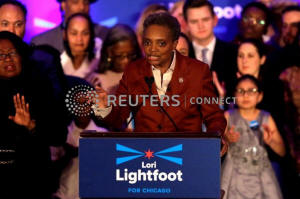Teachers strike taught Chicago's new mayor tough lessons -analysts
 Send a link to a friend
Send a link to a friend
 [November 02, 2019]
By Brendan O'Brien [November 02, 2019]
By Brendan O'Brien
CHICAGO (Reuters) - Chicago Mayor Lori
Lightfoot made strategic errors in the first major fight of her tenure,
an 11-day teachers' strike, but may have learned lessons that will prove
useful as she confronts immense city budget challenges, political
observers said.
Lightfoot, 57, was elected in convincing fashion to become Chicago's
first black woman mayor in April, when she vaulted to victory on
promises to dismantle the city's corrupt political machine and reform
the city's school district.
Her first misstep was offering the Chicago Teachers Union a 16% raise
before talks even began - a maneuver intended to avoid the strike that
caused 300,0000 students to miss class for more than two weeks but
instead emboldened union leadership to push for more spending in other
areas, according to fellow officeholders, political analysts and
Chicago's media.

"The perception was that they were going to take the 16% and run. But
for CTU, it wasn't all about the money," said Alderman Anthony Beale,
who supported Lightfoot in her campaign for mayor, but has since clashed
with the former federal prosecutor regarding committee leadership.
Lightfoot failed to muster enough supporters who could have helped get
her message out to the public during the bruising political battle with
the teachers union, said Dennis Culloton, a political and media
strategist in Chicago.
"At times, the mayor may have been outflanked by the teachers' union's
very effective political organizing," he said.
Having strong supporters will be vital for Lightfoot as she focuses in
on negotiations with Chicago’s police and firefighter unions to replace
collective bargaining agreements that expired in 2016 and 2017, Culloton
said.
In opinion pieces published on Friday, both local newspapers, the
Chicago Tribune and the Chicago Sun-Times, were critical of how
Lightfoot handled the negotiations with teachers, especially by offering
a 16% raise up front.
[to top of second column]
|

Mayoral candidate Lori Lightfoot speaks during her election night
celebration after defeating her challenger Toni Preckwinkle in a
runoff election in Chicago, Illinois, U.S., April 2, 2019.
REUTERS/Joshua Lott/File Photo

Beale agreed in a phone interview, saying the strategy lost
Lightfoot critical leverage and that she will need to sharpen her
negotiation tactics for future labor battles.
Lightfoot would not answer reporters' questions about the strike's
outcome on Thursday.
"I refuse to even talk about this in terms of winning or losing,"
said Lightfoot, who is in her first elected office. "Nobody wins in
a circumstance like this."
Lightfoot's office did not respond when asked for comment on Friday.
The new mayor did win on some points: she secured a five-year
contract, rather than the three years the union sought, and held off
some of the union's bigger-picture demands for affordable housing
and reforming the criminal juvenile justice system.
"She can also look back on this and say that it was good to appear
calm and to stay levelheaded," said Culloton, the consultant.
That approach, he said, will serve Lightfoot well as she deals with
Chicago's fiscal woes that include an $838 million deficit in the
city's upcoming budget.

(Reporting by Brendan O'Brien and Karen Pierog in Chicago; Editing
by Scott Malone and Matthew Lewis)
[© 2019 Thomson Reuters. All rights
reserved.]
Copyright 2019 Reuters. All rights reserved. This material may not be published,
broadcast, rewritten or redistributed.
Thompson Reuters is solely responsible for this content. |